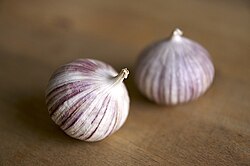Solo garlic, also known as single clove garlic, chinese garlic, monobulb garlic, single bulb garlic, or pearl garlic,[1][2] is a type of Allium sativum (garlic).[3] The size of the single clove varies from approximately 25 to 50 mm in diameter, with an average size between 35 and 45 mm.[2] It has the flavour of the garlic clove but is somewhat milder and slightly perfumed. The appearance is akin to that of a pickling onion, with white skin and often purple stripes. Compared to traditional garlic, solo garlic offers the advantage of being easy to peel quickly.
| Solo garlic | |
|---|---|
 Single clove garlic | |
| Species | Allium sativum |
| Cultivar | Any |
| Origin | Yunnan |


Single clove garlic originated in the mountainous Yunnan province of southwestern China.[1] It is not a single variety of garlic, but rather a product of specific planting practices.[1] As a result, single cloved versions of other garlic species such as Allium nigrum and Allium ampeloprasum are also available.
Growth
editSmall bulbs of solo garlic can be obtained by planting the bulbils of any variety of garlic.[4] However, commercial production comes from areas where garlic is likely to produce a solo bulb due to environmental factors.[citation needed] The climate in these areas, combined with careful cultivation, leads to a large percentage of the garlic crop failing to split into multiple cloves.[citation needed]
Cultivation
editSolo garlic is believed to have originated in Yunnan, China, a mountainous area. The product is known as 独子蒜 "only-child garlic".[1]
See also
editReferences
edit- ^ a b c d Alex, Renton (8 October 2013). "The best garlic varieties: a guide". The Guardian. Retrieved 21 January 2017.
- ^ a b OECD (2017). International Standards for Fruit and Vegetables Garlic. OECD Publishing. p. 9. ISBN 978-92-64-27294-1. Retrieved 2024-09-15.
- ^ Official Journal of the European Union C 201, 23/07/2010: Explanatory Notes to the Combined Nomenclature of the European Communities (PDF), retrieved 30 January 2013
- ^ Wildfong, Bob. "How to Grow Garlic from Bulbils". Seeds of Diversity. Retrieved 23 March 2018.